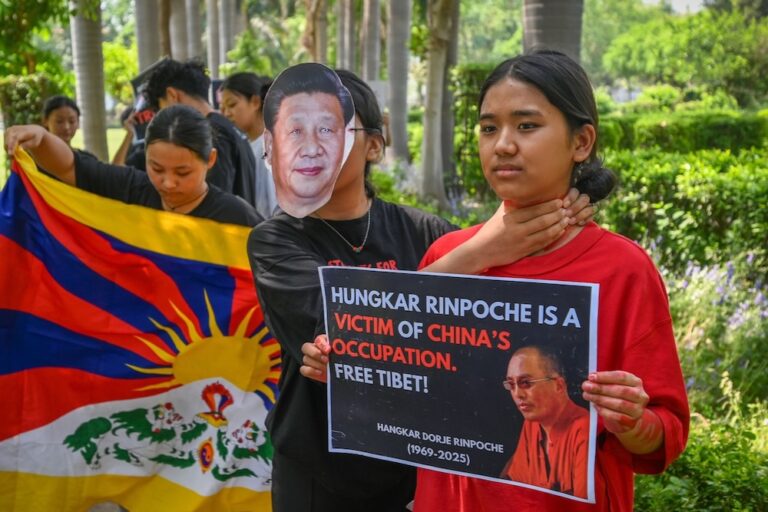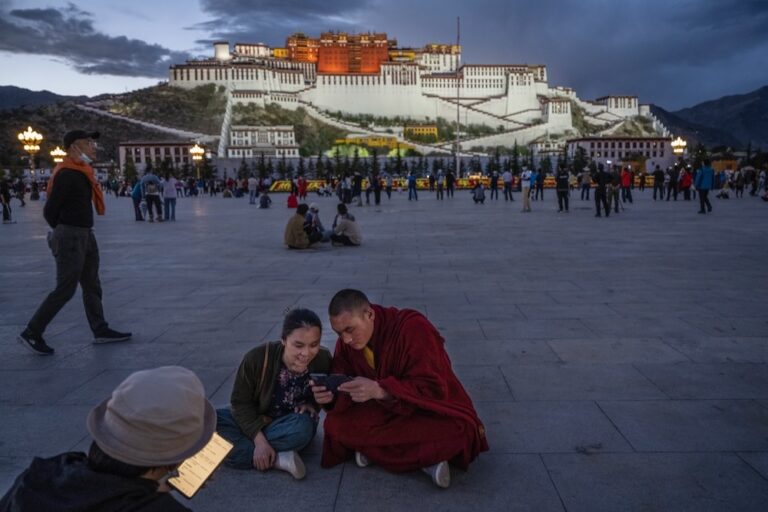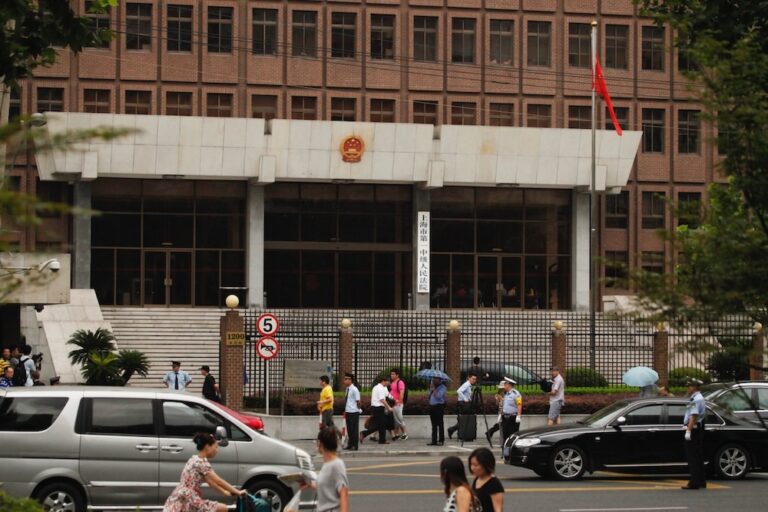While the Chinese Communist Party Congress is notorious for its secrecy, considerable resources were also used to gag the media and dissidents in the lead-up to the Beijing event, IFEX members report.
UPDATE: What China’s new leadership means for press freedom (CPJ, 15 November 2012)
When a nation’s most outspoken journalists are 11-year-olds, is it a good sign for the future? This question was asked by the Committee to Protect Journalists (CPJ) in a recent article. On the one hand, they might grow up to ask probing questions, CPJ considers. On the other hand, they might end up following the path taken by their older peers and stick to scripted exchanges.
The question was triggered by recent events at the 18th Party Congress of the Chinese Communist Party (CCP) that opened in Beijing on 8 November 2012.
Two kids from the Beijing-based Chinese Teenagers News took center stage on 13 November 2012 when they bucked tradition to ask officials questions they’d thought up themselves about rising housing costs and food safety, CPJ reports. The media interest in this relatively minor interlude speaks volumes about how rare it is to hear straightforward, unscripted questions at a political event in China.
Note the surprise of foreign journalists covering the party congress when Australian correspondent Andrea Yu was called on to ask a question and then invited to speak more than once, reports The Guardian. When given such an unusual opportunity, it was remarked on that the journalist confined herself to unchallenging questions – something that may be explained by the relationship between the Global CAMG Media Group and Chinese Radio International (CRI). While the Melbourne-based CAMG is Yu’s employer, the company is controlled by CRI, the Chinese state’s external propaganda station. Chinese politburo members have apparently been calling on Yu to speak because they know she will ask them easy questions, according to media reports.
Grip tightened in the lead-up to the Congress
While the Party Congress itself is always notorious for its secrecy, considerable resources were also used to gag the media and dissidents in the lead-up to the event, IFEX members report.
The authorities tightened their grip on information that could affect the Congress and cracked down on human rights activists and dissidents who are permanently suspected of wanting to destabilise the state, according to Reporters Without Borders (RSF). The government’s censors also made every effort to control news coverage throughout the country. For example, messages about demonstrations were removed from online platforms and social networks were placed under close watch. RSF has compiled a partial summary of the many violations of freedom of information in the weeks preceding the opening of the Congress and continues to log new cases of censorship.
Foreign media outlets were similarly censored and blocked. Aware of their steadily-growing influence, the authorities reinforced the blocking of the Voice of America, BBC, Radio Free Asia and Deutsche Welle websites, according to RSF. On 25 October, information officials blocked the New York Times’ English- and Chinese-language websites after they published an investigative report into the assets of Premier Wen Jiabao and his family, reports IFJ. Also in October, a Sky News TV crew was obstructed while reporting on local environmental protests in Ningbo, and an Agence France-Presse journalist was briefly detained.
The regime also persists in stifling the voices of dissidents from within Tibet. According to RSF and Human Rights Watch, the Chinese government is particularly concerned about suppressing any information about self-immolations by Tibetan monks. These acts of protest have been nurtured in the past four years by harsh penalties against Tibetans who express anti-government opinions, CPJ reports. Six Tibetans have reportedly doused themselves with petrol and set themselves alight since 7 November, the eve of the Party Congress, bringing to 69 the number who are reported to have died in the past year. On 8 November, thousands of students marched in protest in Qinghai province and armed police stepped up their presence in response.
Speaking at the Congress in Beijing, the vice chairman of the local government in Tibet, said: “We do not want to see such incidents,” he said. “We do not want anyone to spoil Tibet as a happy region. For locals, we are checking IDs and for visitors we have checkpoints and security checks on travel . . . We also have a grid management system, so if any immolation happens in a certain block, we can launch an emergency rescue within two minutes.” Little is known about Skynet, the system he was referring to, but it is supposed to have a camera on every road in Tibet and in the Tibetan areas of Gansu and Sichuan, according to The Telegraph.
Long-term impact of the Party Congress crackdown
While some of the measures being adopted to silence dissidents and preempt protests might expire after the Party Congress, others will not, and the overall effect of the crackdown could be felt for years, warns Freedom House.
At least some of those detained are unlikely to be released soon. Others have been under house arrest or face loss of income, confiscated property, and the harassment of their families.
The crackdown serves to deter would-be activists, notes Freedom House, by signaling that those who cross the line will face relentless harassment whenever the party deems a certain time to be “sensitive.” Moreover, the clampdown has a systemic, corrosive effect on the rule of law and further entrenches impunity. If the downward spiral of repression continues, it risks sparking further popular resentment and unrest, as Chinese citizens become more assertive of their rights, Freedom House cautions.
RSF urged Xi Jinping, who is expected to be the next paramount leader, to embark on far-reaching political reforms, but notes that the censorship that has surrounded the 18th Congress has so far given little hope of a China that will respect media freedom.
According to CPJ, there is one possible change that could signal media reform under the new leadership. Two positions on the nine-member Standing Committee may be eliminated, reducing the number to seven. Of significance is the fact that the positions being considered for elimination are the leaders in charge of propaganda and police. “Edging the propaganda chief further from the center of power is not the same as dismantling the extensive machinery of information control CPJ has documented in China. But if it happens on 15 November, it could be a sign that today’s pre-teen journalists will be able to continue asking real questions of their leaders in the future,” CPJ reported.


